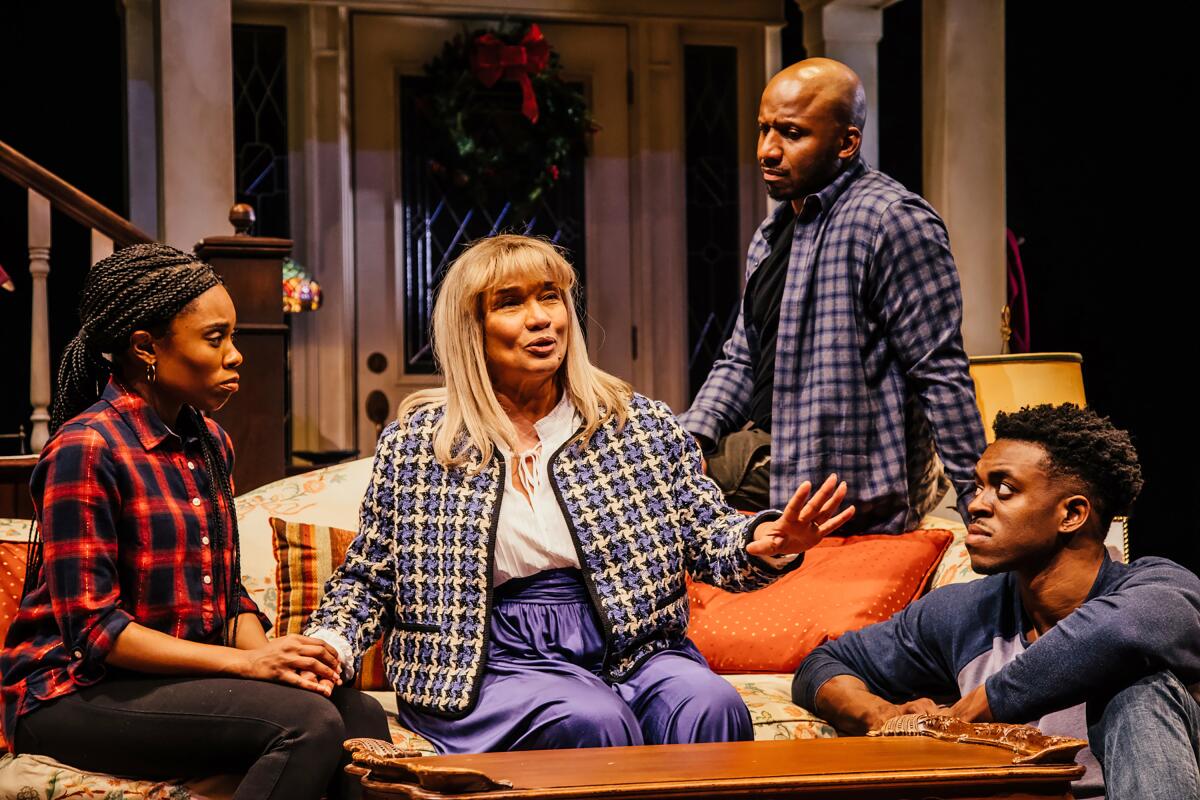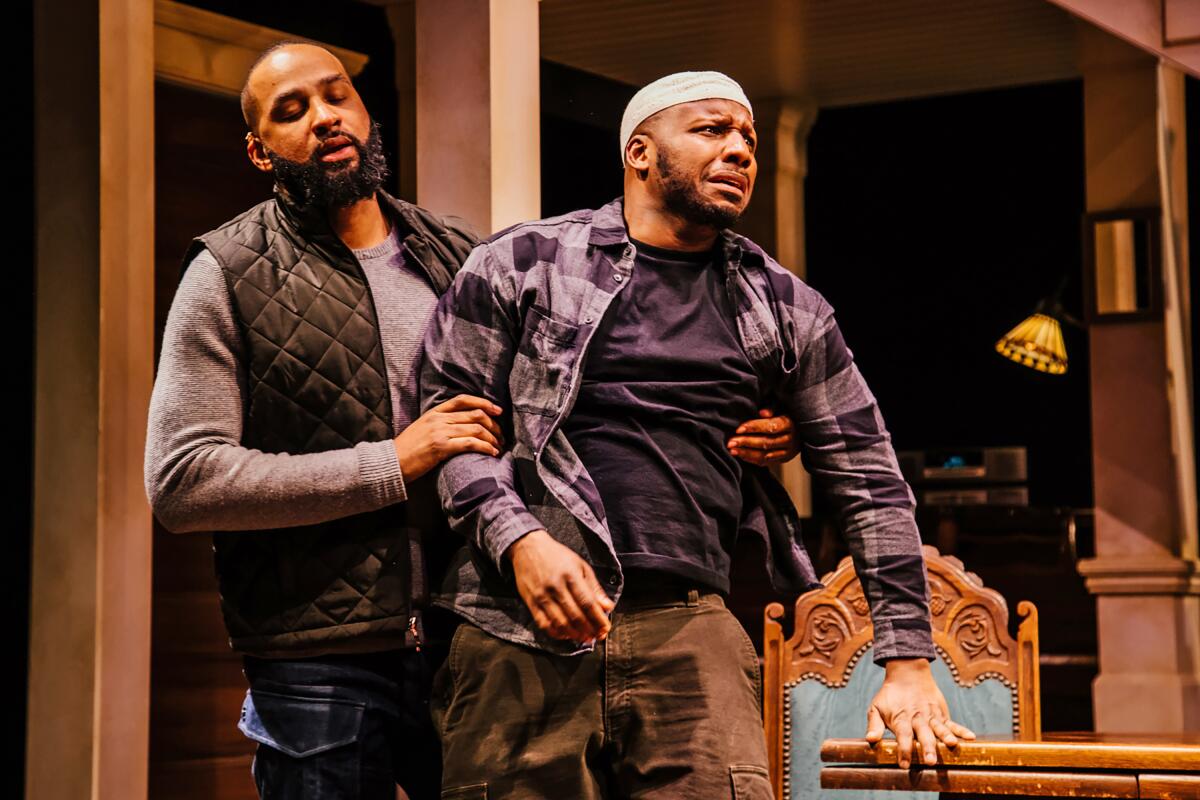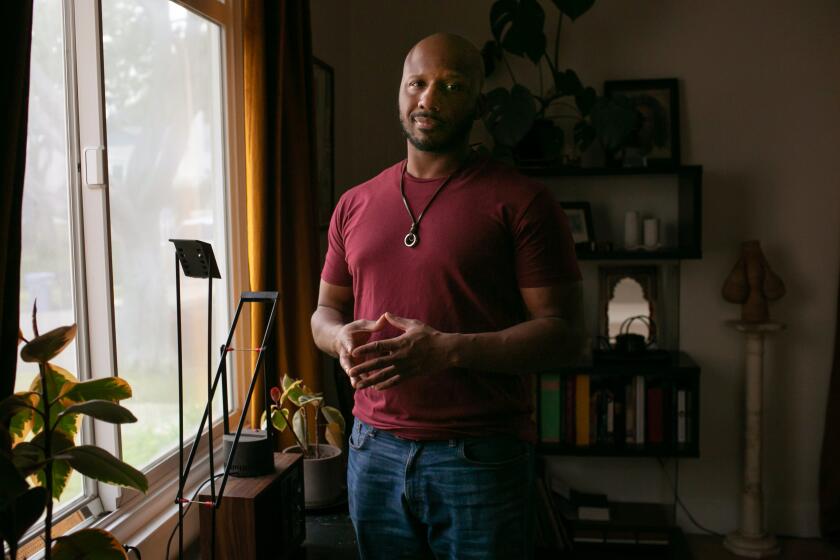Review: Conflict, intrigue and family dysfunction converge in ‘The First Deep Breath’

- Share via
Bigger isn’t always better, though there’s a celebrated tradition in the American theater of epic family dramas, stretching from Eugene O’Neill’s “Long Day’s Journey Into Night” to Tracy Letts’ “August: Osage County.”
I would not be the first critic to note that a good many of these landmark works suffer from unnecessary sprawl. Grueling marathons in family pathology, they invite audience members to immerse themselves for hours in the domestic tragedies of characters who love but can no longer abide one another.
Exorcism is the mission of these plays, a typically protracted dramatic ritual that entails the confrontation with old ghosts. “The First Deep Breath,” a recent addition to the genre by playwright and actor Lee Edward Colston II, hews closely to haunted protocol but from a Black cultural perspective. The content is fresh but the style is exceedingly familiar.
Lee Edward Colston II, the playwright and actor of ‘The First Deep Breath’ at Geffen Playhouse, fell in love with theater in high school. But his journey took a few detours.
The play, which opened Thursday at the Geffen Playhouse under the direction of Steve H. Broadnax III, flushes out enough secrets for several limited series. The saga, more psychologically focused than the historically expansive family dramas of August Wilson, runs more than four hours with intermissions. But there still isn’t sufficient time to reckon with all the bulging back stories.
The drama takes place in the home of Pastor Albert Melvin Jones III (Herb Newsome), a prominent Black preacher in Philadelphia who has just been given the green light by the mayor to move forward on his dream of building a megachurch. His wife, Ruth (Ella Joyce), is lost in the fog of Alzheimer’s disease, which developed not long after the death of her daughter Diane six years ago.
Her passing happened around the same time that Albert and Ruth’s eldest son, Little Albert, who now goes by Abdul-Malik (played by Colston himself), was incarcerated on a rape charge. His release coincides with the upcoming anniversary of his sister’s death, which will be commemorated in a religious service tied to the megachurch announcement.
The family grieving process has a lot of unfinished business now that Abdul-Malik is back home. He resents the way his father seems to hold him accountable for what happened to Diane, even though it was her struggles with substance abuse that precipitated her tragedy.
Making things more combustible, Ruth’s illness has her continually calling for Diane. Worse, she confuses her with other daughter, Dee-Dee (Candace Thomas), Diane’s identical twin, who goes along with it so as to not make her mother relive the tragedy again.
Folks, we’re just getting started. It would be amiss to give away plot points that are deployed for maximum surprise, but other family members and their loved ones aren’t exactly short on baggage.
AJ (Opa Adeyemo), the youngest son in the family who’s expected to make good on a religious scholarship, pretends he’s at basketball practice when he’s really pursuing his creative dream, which he knows his father won’t approve of. Aunt Pearl (Deanna Reed-Foster), Ruth’s sister and live-in caretaker, survived being shot by her husband and is grappling with her complicated feelings for her sister’s husband.

Questions about the circumstance of Abdul-Malik’s crime are raised, but Abdul-Malik is so intent on hiding something else about himself that he’d rather not correct his father’s mistaken assumptions about his guilt. His closest friend, Tyree Fisher (Keith A. Wallace), a sensitive soul who’s treated as a member of the family, knows more and feels more than he can say on the subject, to his great sorrow.
Leslie Carter (Brandon Mendez Homer), a male nurse with a caretaking heart, wants more than anything to marry Dee-Dee, but will she find the strength to separate from her family so that she can start her own? You’ll have to stay tuned to three long acts to see if the characters resolve their dilemmas.
Colston never lets dramatic interest wane. He’s an entertaining writer, skilled at fleshing out a theatrical world and keeping it pulsating with conflict and intrigue. And scenic designer Michael Carnahan creates one of the play’s central characters in the Jones family’s comfortable home.
The playwriting method is episodic, built around scenes of confrontation. Entrances and exits revolve around characters making shocking discoveries or calling each other out for hypocrisy or deception.
The sheer proliferation of such seismic moments gives “The First Deep Breath” an air of melodrama. The daily rhythm of the household is remarkably credible, but the plot has the overstuffed quality of a television drama. As a result, the arc of the domestic tragedy becomes obscured by the bumper-to-bumper traffic of incidents.
Lee Edward Colston II, the playwright and actor of ‘The First Deep Breath’ at Geffen Playhouse, fell in love with theater in high school. But his journey took a few detours.
Colston doesn’t so much end his play as detonate it. Perhaps the explosion is unavoidable given the tinderbox of emotions. But the drama flails in its final stages. Each character gets a turn to speak his or her truth, but the proffered wisdom has a self-help ring to it.
The ensemble sustains the play’s theatrical momentum, though not all of the characters are fully dimensional. Leslie and Tyree often seem in service to the plot either as sounding boards or sermonizers. Ruth’s memory problems are used selectively and metaphorically, with her disease transforming into a truth-telling blitz during a Thanksgiving dinner that evokes the mealtime family meltdown in “August: Osage County.”
Not even Colston can make Abdul-Malik’s strained story add up, but his writing is touchingly attentive to the various ways male tenderness can manifest under oppressive conditions. The play is also keenly aware of the way that bad behavior doesn’t necessarily tell the whole story of a character.
Reed-Foster’s Pearl brings this point home in a speech that incited cheers from the opening-night audience. It wasn’t so much the words that Pearl chose to explain her ill-judged actions. Rather, it was the power of self-reckoning — the anguished, universal quest of Colston’s family drama — that was given thunderous voice in Reed-Foster’s performance.
'The First Deep Breath'
Where: Geffen Playhouse’s Gil Cates Theater, 10886 Le Conte Ave., Los Angeles, Calif.
When: 1 p.m. and 7 p.m. Saturdays and Sundays, 7:30 p.m. Tuesday through Friday. Ends March 5.
Tickets: Starting at $39
Info: geffenplayhouse.org
Running time: 4 hours and 10 minutes, including two intermissions.
More to Read
The biggest entertainment stories
Get our big stories about Hollywood, film, television, music, arts, culture and more right in your inbox as soon as they publish.
You may occasionally receive promotional content from the Los Angeles Times.












